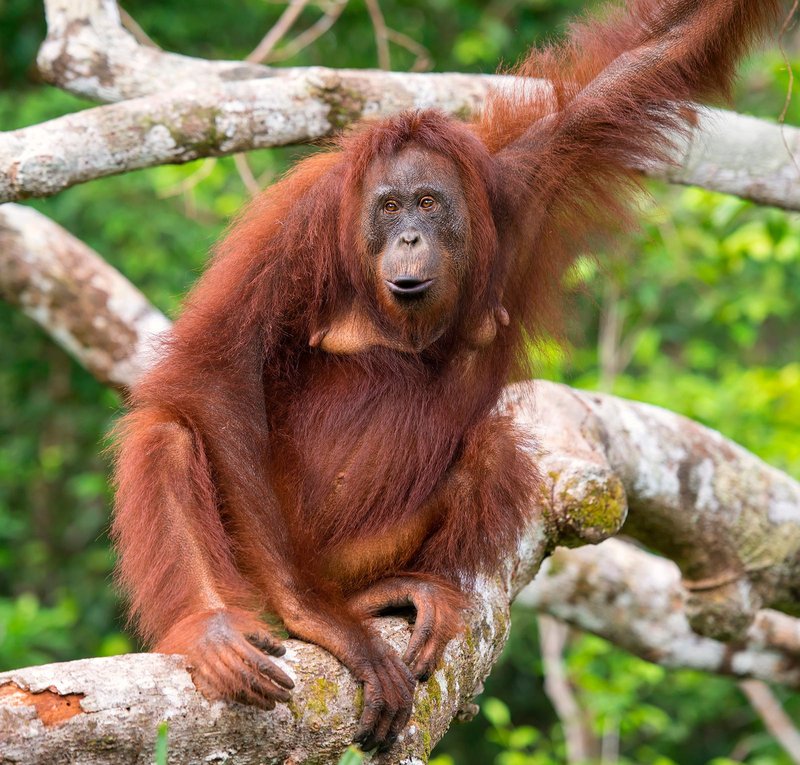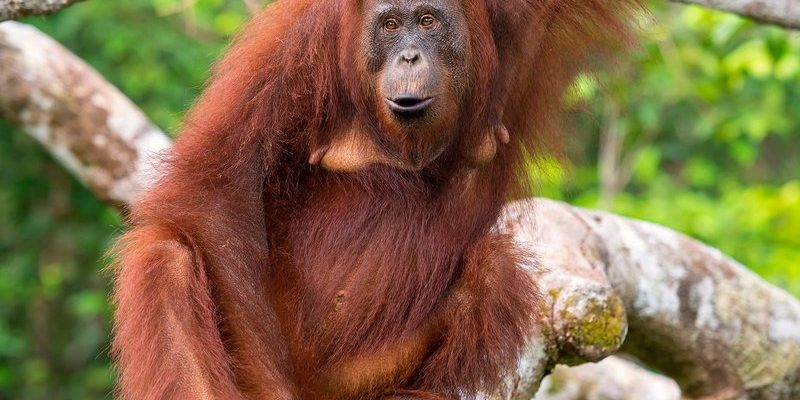
Found primarily in the rainforests of Borneo and Sumatra, orangutans are unique not only for their striking red hair and elongated arms but also for their intelligence and social behaviors. They’re often seen as symbols of conservation due to their endangered status and the critical role they play in maintaining the health of their forest environments. Let’s dive into how orangutans impact their ecosystem and why preserving them is essential for the planet.
1. Seed Dispersers: Nature’s Gardeners
One of the primary roles of orangutans in their ecosystem is being seed dispersers. When they munch on fruits, they often swallow the seeds whole. Later, when they move around or find a new spot to hang out, they…well, let’s just say they leave behind a little gift. This process helps grow new plants and trees.
Here’s the thing: rainforest ecosystems depend heavily on a diverse range of plants. Without orangutans spreading those seeds, certain plant species might struggle to reproduce. Imagine if your favorite food could only grow in certain neighborhoods. It wouldn’t be long before that dish became pretty hard to find! By promoting plant growth, orangutans help sustain the food web in their habitats.
Fruit-Eating Behavior
Orangutans have a wide-ranging diet that primarily consists of fruits. They’re particularly fond of delicious snacks like durian, figs, and rambutan. Eating a variety of fruits not only nourishes them but also ensures that they’re dispersing a broad selection of seeds. This eclectic eating habit is crucial for maintaining plant diversity and overall forest health.
2. Habitat Engineers: Shaping the Forest
Orangutans also act as habitat engineers. Their constant movement through the trees creates trails that other animals can use. Think of it like a highway system for wildlife! As they swing and climb, they sometimes break branches and create open spaces, allowing sunlight to reach previously shaded areas.
This light enables other plants to grow, which in turn supports a variety of wildlife. If orangutans disappeared, the forest might become overcrowded and lose its vibrant diversity. By maintaining the balance of light and space, orangutans play a direct role in fostering life in their environment.
Supporting Other Species
When orangutans create these open spaces and pathways, they’re not just helping other plants thrive—they’re also assisting various animal species. Lemurs, birds, and even insects benefit from the increased food options and easier movement through the forest. Imagine a bustling café; if it suddenly becomes too crowded, some customers might leave for somewhere quieter and more enjoyable.
3. A Reflection of Forest Health
Believe it or not, orangutans can be indicators of forest health. Scientists often study their populations to gauge the overall well-being of the rainforest. If orangutans are thriving, it usually suggests that their habitat is healthy. Conversely, if their numbers decline, it may signal environmental problems.
From deforestation to climate change, many issues can affect their survival. When we see a drop in orangutan populations, it’s a clear red flag. Preserving their habitat also protects countless other species that share the same environment. If we want to ensure a healthy ecosystem, safeguarding orangutans should be a priority.
Importance of Monitoring Populations
Monitoring orangutan populations is crucial for conservation efforts. Scientists use various methods, like camera traps and field studies, to track their numbers and behaviors. This data helps inform strategies to protect them and their habitats. By ensuring that orangutans are thriving, we can also protect the numerous other creatures that depend on the same ecosystem.
4. Cultural Significance and Conservation
Beyond their ecological roles, orangutans hold a special place in the hearts of many cultures. In some communities, they symbolize connection to nature and conservation. Protecting these animals goes beyond just saving a species; it’s an opportunity to honor our collective responsibility to the environment.
Conservation efforts, such as habitat restoration and wildlife protection laws, are crucial. Organizations work tirelessly to preserve orangutan habitats, often involving local communities in these efforts. When people understand the importance of preserving orangutans, they’re more likely to participate in protecting their environment.
Community Involvement
Engaging local communities is vital for successful conservation. Many programs help teach residents about the importance of orangutans and how to coexist with them. With education and resources, communities can make informed choices that benefit both their lives and the environment.
5. The Impact of Deforestation
Unfortunately, habitat destruction is one of the biggest threats to orangutans. Deforestation, primarily for palm oil plantations and logging, reduces their living space. When forests are cut down, it disrupts their roles as seed dispersers and habitat engineers. It’s a classic example of the domino effect: when one species suffers, it impacts the entire ecosystem.
You might be wondering how deforestation affects not just orangutans but the entire planet. These rainforests help regulate the climate and store carbon dioxide. Losing them can lead to increased greenhouse gases in our atmosphere, which could accelerate climate change.
What Can We Do?
There’s good news! Individuals can take steps to support orangutan conservation. From reducing the use of products containing palm oil to supporting responsible brands, every small action counts. Also, by educating others about orangutans and their roles in the ecosystem, we can spread awareness and foster a greater sense of urgency around their protection.
6. The Future of Orangutans in the Ecosystem
So, what does the future hold for orangutans? It really depends on our actions today. As our understanding of their ecological importance grows, so does the urgency to protect them. Conservation initiatives, awareness campaigns, and sustainable practices play a critical role in ensuring that orangutans can continue to thrive in their natural habitats.
We can envision a future where orangutans aren’t just surviving but flourishing, helping maintain the balance of their ecosystems. Imagine walking through a lush, vibrant rainforest alive with the sound and movement of these incredible creatures. That future is possible with collective effort.
Your Role in Conservation
Even though it may seem overwhelming, each of us can contribute to conservation in simple ways. Whether by volunteering, donating to organizations, or being mindful of our consumption habits, every action counts. By preserving orangutans, we’re not just saving a species—we’re safeguarding our planet for future generations.
As we wrap up this discussion about the orangutan’s role in its ecosystem, it’s clear that their presence is invaluable. They enrich the rainforest and remind us of the interconnections within nature. Protecting orangutans means protecting a world that benefits us all, ensuring a healthier planet. Let’s embrace that responsibility together!

